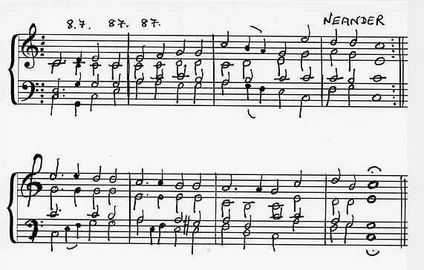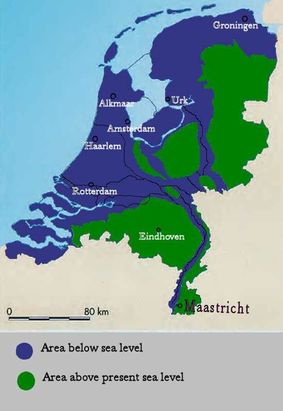Neanderthal hymn writerDavid Bridgeman-Sutton has been reading about the history of occupants of north Europe - which leads him to some worrying thoughts about their future - and the organs in their care
Praise to the Lord, the Almighty, the King of creation;
O my soul, praise him, for he is thy strength and salvation: Come ye who hear, Brothers and sisters draw near, Praise him in glad adoration. |
|
This fine hymn, found in many English language hymnals, is by Joachim Neander (fig 1). Translation from the German was by the indefatigable Catherine Winkworth (d.1878). In recent years, another of Neander's hymns, All my hope on God is founded, has become popular. Here, the translator was Robert Bridges (d.1930). Bridges was unique in combining the possession of advanced medical qualifications with literary abilities that led to his becoming Poet Laureate of England.
|
Neander died in 1680 at the age of 30 - young even for those days. Outside Germany, his name today might well have meant nothing more than this hymn tune but for the workings of chance. Citizens of Dusseldorf held him in such high regard that they renamed his favourite walking place near the town, “Neander-thal” - Neander's valley. Later, spelling changes removed the letter “h” from the word.
It was in the 1850s that the gathering pace of industrial development caused extensive quarrying of the limestone of Neander's valley. A cave was discovered in which lay fossilized bones. Quarrymen the world over have a stock response to events of this kind: hide the evidence, keep silent and hope that no-one disrupts extraction in the interests of antiquarian research.
The strategy, though tried, failed on this occasion; the bones were excavated and the hitherto unknown ancestor of mankind discovered was named Neanderthal man. This event is one of many recorded in Chris Stringer's book Homo Britannicus (published 2006). The volume traces the history of the occupants of Northern Europe – to which the British Isles were originally attached physically. Man and other species ebbed and flowed across the continent as climate varied between arctic and sub-tropical and as the shapes of land masses were altered.
The strategy, though tried, failed on this occasion; the bones were excavated and the hitherto unknown ancestor of mankind discovered was named Neanderthal man. This event is one of many recorded in Chris Stringer's book Homo Britannicus (published 2006). The volume traces the history of the occupants of Northern Europe – to which the British Isles were originally attached physically. Man and other species ebbed and flowed across the continent as climate varied between arctic and sub-tropical and as the shapes of land masses were altered.
|
Stringer's later pages, discussing the probable effects of the melting of polar ice caps - which is occurring at alarming rate – give organ lovers pause of thought. Many of Europe's oldest and most highly-regarded organs are faced with the ever-growing danger of flood. Some are in areas that could, sooner rather than later, lie permanently beneath the sea. The fate of these instruments is, of course, a minor matter in comparison with the human disturbance and misery that would result from homelands being lost, but must be of great concern to organists.
Figure 3. shows the area of The Netherlands that is already below sea level. At present this is protected by walls and pumps. Projected rises in sea levels of 5 to 7 metres would pose problems to people as skilled in keeping the waters at bay as are the Dutch. Haarlem, Alkmar, Groningen and other towns in threatened areas have organs of world-repute. |
David Bridgeman-Sutton,
March, 2008
March, 2008
Thanks to:
Althea Bridgeman-Sutton for the map, to Dr P. David Polly of Indiana University for various references.
Althea Bridgeman-Sutton for the map, to Dr P. David Polly of Indiana University for various references.




